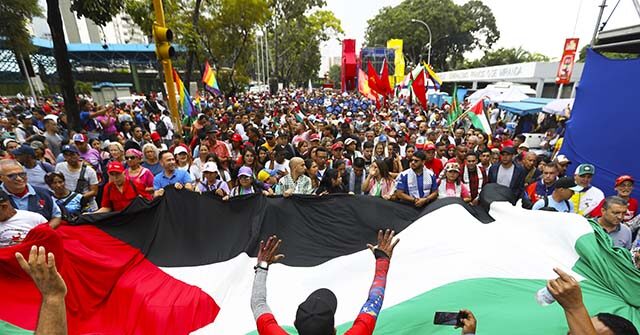On a day marking the anniversary of a tragic terrorist attack in Israel, the Venezuelan socialist government organized an “anti-fascist and anti-Zionist cultural tribune” to voice its unwavering support for Palestinian causes and decry what it terms the “76 years of genocide” committed by Israel. This event illustrates the Venezuelan regime’s longstanding confrontational relationship with Israel, which has intensified since the Hamas attacks on October 7, 2023. The leaders of the Venezuelan government, particularly under the rule of Nicolás Maduro, have openly sided with Hamas and other groups challenging Israeli statehood, framing their rhetoric against Israel within the broader context of leftist international solidarity.
During this gathering, which was led by Diosdado Cabello—who not only holds a significant political position but is also wanted by the U.S. for various charges—the regime showcased representatives from its United Socialist Party (PSUV) and allied nations such as Iran and Lebanon. Cabello used strong language to assert solidarity with the Palestinian struggle, claiming that raising the Palestinian flag equates to fighting for freedom globally. His remarks reflected the regime’s commitment to portraying its support for Palestine as part of a larger fight against imperialism and colonialism, equating their political objectives with global anti-colonial movements.
The Venezuelan Attorney General, Tarek William Saab, reinforced the idea that solidarity with Palestine continues the legacy of the late socialist leader Hugo Chávez. Saab’s statements indicated that Chávez and another prominent leftist leader, Fidel Castro, had set a precedent for supporting Palestinian causes on an international stage. This narrative helps the current regime align itself with historical figures revered in leftist circles while condemning what they perceive as a global failure to address the alleged atrocities of Israel against Palestine, Lebanon, and other nations.
During the event, Palestinian Authority representatives expressed their gratitude for Venezuela’s backing and echoed accusations of ethnic cleansing against Israel. Fadi Alzaben, the Palestinian ambassador, claimed that the Israeli military has consistently engaged in actions that severely harm innocents, especially children. Despite the strong rhetoric against Israel, there was a conspicuous absence of acknowledgment regarding the brutal assaults perpetrated by Hamas during their October attack, which resulted in significant Israeli civilian casualties and other atrocities.
Although Nicolás Maduro did not attend the tribune, he made remarks about the event through his weekly broadcast, framing the ongoing conflict in terms of a broader struggle for independence against fascism and colonialism. Maduro characterized Israeli Prime Minister Benjamin Netanyahu as “insane and criminal,” suggesting that media framing Israel’s defensive actions as a war against Hamas contributes to the alleged genocidal narrative. By portraying the situation in such stark terms, Maduro attempts to galvanize support for his regime’s policies and stance among domestic and international audiences.
Ultimately, the Venezuelan socialist regime’s recent events highlight its political motivations and ideological allegiances in its ongoing confrontation with Israel. By aligning with Palestinian issues, the regime not only seeks to assert its place in the geopolitical landscape as a defender of the oppressed but also utilizes this position to reinforce its domestic legitimacy. The rhetoric of solidarity, anti-imperialism, and historical continuity, while it strategically resonates in leftist discourse, obscures the complexity and tragic realities of the ongoing conflict, leaving many critical perspectives largely unaddressed.

